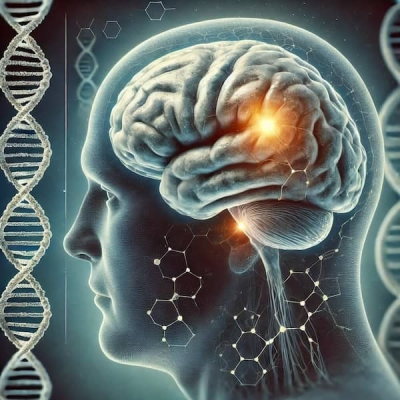Huntington's disease – What is it and how can CBD help?
Author: Lucie Garabasova
Huntington's disease is a rare but serious neurodegenerative disorder that progressively affects motor skills, cognitive functions, and emotional stability in patients. As there is currently no cure for Huntington's disease, research is focused on options for alleviating symptoms and slowing disease progression. One promising area is the use of cannabidiol (CBD), a non-psychoactive component of the cannabis plant. In this article, we will look at what Huntington's disease means, how it affects patients, and how CBD might help in managing it.
What is Huntington's disease
Huntington's disease is an inherited neurodegenerative condition that causes the gradual death of nerve cells in the brain. This disease affects motor skills, cognitive functions, and the emotional state of the patient.
Causes of the disease
Huntington's disease is caused by a mutation in a gene called HTT (huntingtin). This gene contains instructions for producing the huntingtin protein, which is essential for the normal functioning of brain cells. In people with Huntington's disease, there is an abnormally long stretch of repeating DNA sequences (CAG) in this gene, leading to the formation of a defective protein that causes the degeneration of nerve cells.
The disease is inherited in an autosomal dominant manner, meaning that a child has a 50% chance of inheriting the mutated gene if one parent is a carrier. If a child inherits the mutated gene, they will develop Huntington's disease at some point in their life.
Symptoms of Huntington's Disease
Symptoms usually begin to manifest between the ages of 30 and 50, although they can appear earlier or later. The main symptoms include:
- Motor symptoms: Involuntary movements (chorea), muscle stiffness, coordination and balance problems.
- Cognitive symptoms: Memory issues, difficulties with concentration, judgment, and planning.
- Psychological symptoms: Depression, anxiety, irritability, personality changes, and dementia in later stages.
Progression
Huntington's disease progresses slowly but relentlessly, leading to severe physical and mental disabilities. The life expectancy after the onset of symptoms typically ranges from 10 to 25 years.
Treatment
Currently, there is no cure for Huntington's disease. Treatment focuses on alleviating symptoms and improving quality of life. Medications are used to control motor symptoms, along with antidepressants and other pharmacological and non-pharmacological approaches.
Can CBD help in treatment?
CBD (cannabidiol) has been researched in recent years as a potential complementary treatment for various neurological disorders, including Huntington's disease. While research on this topic is still in its early stages, there is some evidence and theoretical reasons why CBD might be beneficial in treating certain symptoms of Huntington's disease.
Potential benefits of CBD for Huntington's Disease
- Neuroprotective effects: This means it could help protect nerve cells from damage. This is especially important in Huntington's disease, which is characterized by the gradual degeneration of neurons.
- Alleviation of motor symptoms: CBD could help with motor issues, such as involuntary movements (chorea), which are a common symptom of Huntington's disease.
- Anti-inflammatory effects: Inflammation in the brain plays a role in the progression of Huntington's disease. CBD has well-documented anti-inflammatory properties that could help reduce the inflammatory processes associated with this disease.
- Improvement of mental state: CBD is being studied for its potential antidepressant and anxiolytic (anti-anxiety) effects. In patients with Huntington's disease, who often suffer from depression, anxiety, and mood swings, CBD could provide relief.
How to take CBD?
When customers with this diagnosis contact us, we definitely recommend using a combination of CBD and CBG oil, CBD capsules, and also fish oil with CBD.
Ideally, the dosage is 1-2 tablespoons of CBD oil in fish oil (starting with teaspoons and gradually increasing the dosage), 3-4 drops of CBD + CBG oil, and 1-2 CBD capsules daily.
For each case, you can then contact us individually in the cannabis counseling service.
Studies on Huntington's Disease and CBD
- Controlled clinical study: This study investigated the effects of CBD on patients with Huntington's disease. Patients took 10 mg/kg of CBD daily for six weeks. The results did not show significant improvement in motor functions, but the study highlighted the need for further research with higher doses.Canna Health Amsterdam ®
- CBG (Cannabigerol) research: Another study focused on cannabigerol (CBG), another cannabinoid that showed strong neuroprotective effects in a Huntington's disease model, suggesting that CBG could be promising for treating this condition.Canna Health Amsterdam ®
- 2016 Study: A randomized controlled trial published in the journal Neurotherapeutics examined the safety and efficacy of CBD in patients with neurodegenerative diseases, including Huntington's disease. The study found that CBD was well tolerated and did not lead to serious side effects, although the benefits in symptom management were limited and require further research.


